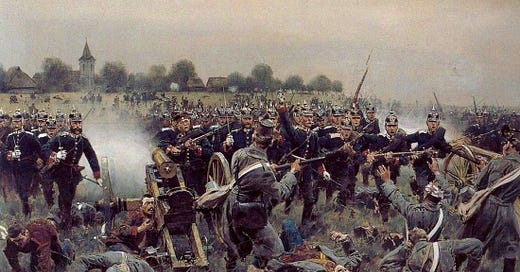The following observations were written by General Alexandre Percin, a French veteran of the Franco-Prussian War of 1870-1 who, among many other things, coined the term “fire support.”
Study was not in vogue in the army of the Second Empire; and, for characters used to passive obedience, that which was not written in the Regulations did not matter at all. At this time, officers were required to know by heart the regulations then in force. They were required to recite them every year. Some officers prided themselves to having memorized the Regulations to the point where they could recite them backwards.
A very different spirit reigned in the Prussian Army.
In 1858 - I was then twelve years old - my older brother was a lieutenant of engineers, stationed at Metz. The city of Luxembourg was occupied by a Prussian garrison. The French officers and the Prussian officers of Luxembourg were cordial neighbors. They invited each other to lunch. My brother told me that, arriving at Luxembourg (in the company of Captain Denfert-Rochereau, who would later become the heroic defender of Belfort), he was greeted at the train station by an officer whose first question was “Have you read the most recent issue of the Military Spectator?”
The Military Spectator was one of those rare military journals that appeared in France. The Prussian officers read it regularly, but the majority of French officers were ignorant of its existence. Study was not encouraged by the grands chefs of the French Army.
In the course of lunch, Captain Denfert, having directed the conversation to the subject of the sieges of Sevastopol and Puebla (in which he had participated), was told by a Prussian engineer officer: “Monsieur le Capitaine, how lucky you were to have, as an officer of engineers, participated in two sieges.” A similar compliment had never been offered to Captain Denfert in France. A French officer had congratulated him on having [taken part in] many campaigns, and, as a result, opportunities to advance [in rank] more quickly or to be decorated sooner, but, he was not congratulated for having been better educated than his comrades.
This love for study among the Prussians was must be considered even more meritorious when it is remembered that they advanced by strict seniority. That which pushed them to work was not the hope of getting ahead more quickly, it was the desire to contribute to the increase of the power of their army and the grandeur of their fatherland.
In his visits to Luxembourg, my brother learned that the Prussian Army regularly carried out: by observing the fall of shot in relation to the target, while, with us, firing practice took place at known distances of about 400 meters and were thus reduced to exercises in aiming.
In telling me the story of these visits, my brother (in whose judgement I had a great deal of confidence, because he was very intelligent and very well instructed), convinced me that, if I were to become a soldier, I would take as my models, not French officers, but German ones.
If French officers were less studious and less well educated than Prussian officers, they were much more so than Austrian officers, whose ignorance and laziness were legendary. In 1859, the French Army beat the Austrian Army at Montebello, Magenta, and Solferino. It was an easy victory.
In 1866, the Prussians took less trouble to beat the Austrians at Königgrätz. I was, at the time a student at the École Polytechnique. I spent a part of my walking-out days with my brother who was a lieutenant in the light infantry battalion (Bataillon de Chasseurs à Pied) of the Imperial Guard. The officers of that battalion ate together. I took my meals with them. I heard their conversations. They struck me as being a little jealous of the success of the Prussian Army. They did not believe [however] in the superiority of that army over the Austrian Army or our own.
Source: Alexandre Percin, Souvenirs Militaires, 1870-1914, (Paris: L’Armée Nouvelle, 1930), pages 24-27






